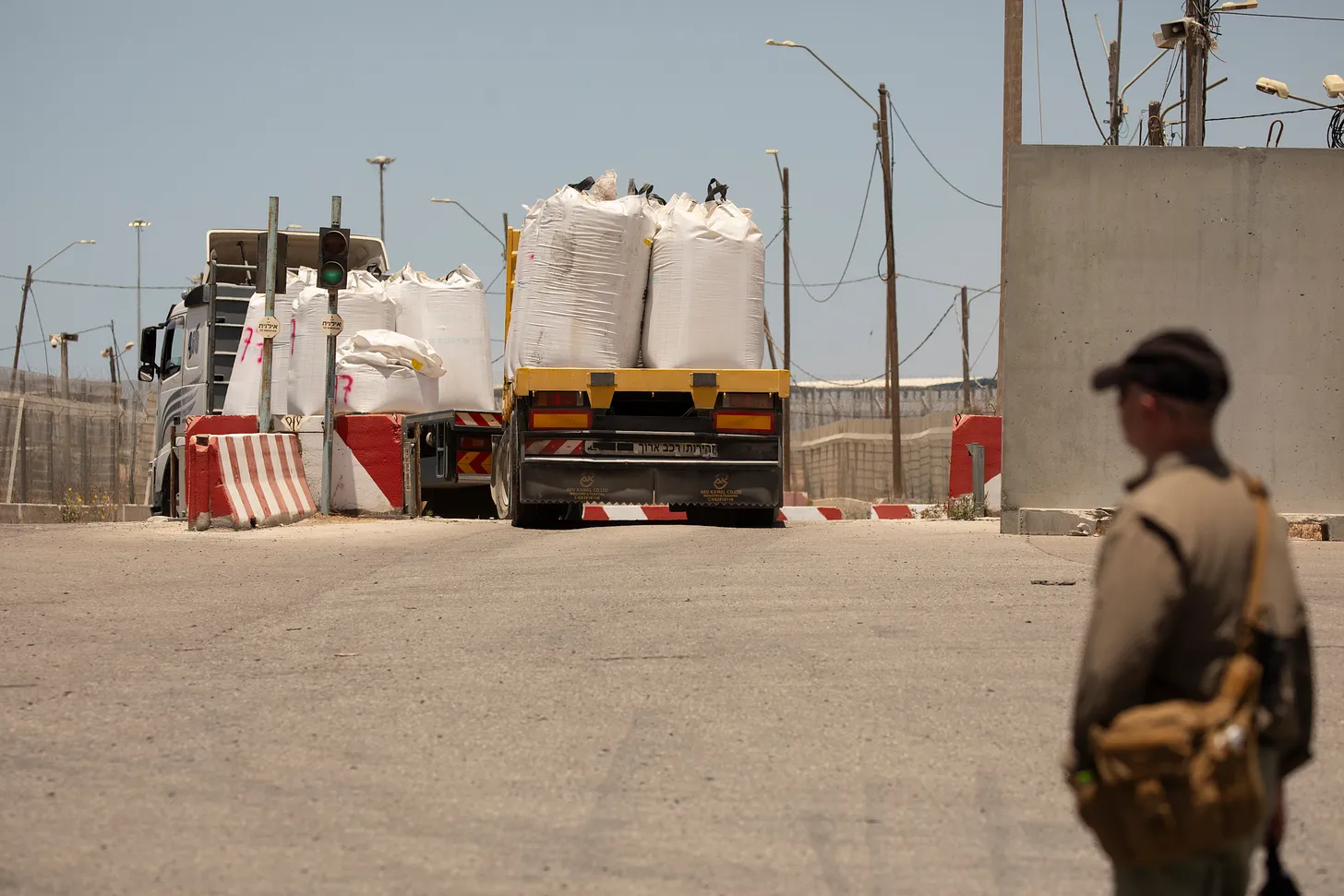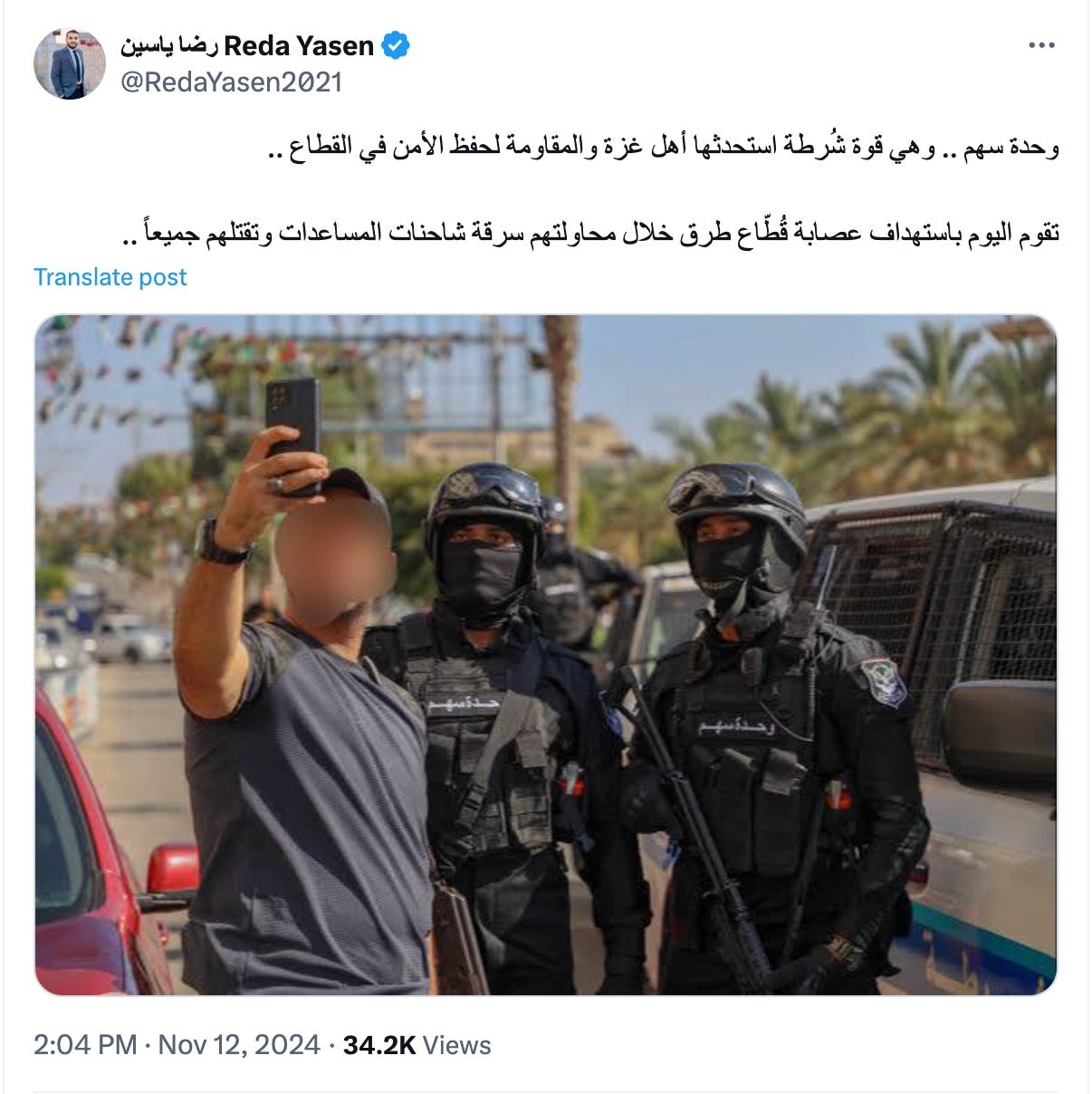Gaza Security Forces Ambush Gang Accused of Looting Aid with Israeli Support
The gang members are “operating in cooperation with the Israeli forces” to target aid convoys, Hamas’s Basem Naim said.
Sharif Abdel Kouddous and Jeremy Scahill
Nov 19
A worker watches a truck loaded with humanitarian aid as it crosses into the Gaza Strip at the Karam Abu Salem (Kerem Shalom) crossing on June 17, 2024. (Photo by Amir Levy/Getty Images)
Palestinian security forces on Monday killed at least 20 members of an organized gang allegedly responsible for looting aid trucks in the southern Gaza Strip, according to a statement by the Interior Ministry in Gaza. The ambush by local security forces came two days after nearly 100 trucks were violently looted after crossing into southern Gaza in one of the biggest raids of its kind since the start of the war.
For over a year, Israel has used starvation as a weapon of war, restricting aid to Palestinians in Gaza to such a degree that a UN-backed panel last week issued an alert, warning of “an imminent and substantial likelihood of famine" across the enclave. The trickle of goods that are allowed in are being increasingly targeted by armed criminal groups, who either force truck convoys to pay exorbitant extortion fees or simply rob the aid. Much of this is facilitated by the Israeli military, who have systematically targeted Palestinian security forces charged with protecting the convoys, and then have allowed armed gunmen to attack aid convoys in areas under its control.
“These are groups of men from specific clans or families, mostly criminals, who formed gangs to steal the humanitarian aid, either by taking armed control of trucks or imposing a fee, thousands of dollars for each truck. The stolen goods were sold again on the black market at very high prices. Usually, the gangs operate meters away from the Israeli army, carrying different types of weapons, and have all the communication equipment,” said Dr. Basem Naim, a senior member of Hamas’s political bureau and a former government minister in Gaza. “There were repeated attempts to contact them and to demand them to end these kinds of attacks and to leave the area, but in vain,” Naim told Drop Site News. “There was a tremendous pressure from the people to end this phenomenon by any means, because of the catastrophic consequences on the humanitarian situation. It was clear for everyone that they are operating in cooperation with the Israeli forces, and protected by them, and any attempt to go forcefully against them was encountered by a very aggressive Israeli response, so that dozens of young people were killed by the Israeli forces, while they tried to protect the humanitarian aid.”
Naim’s comments follow extensive reporting on how the Israeli military effectively allows humanitarian aid convoys to be looted. “The Israel Defense Forces is allowing armed Palestinians to loot aid convoys entering Gaza and to extort protection money from them,” a recent investigation by Haaretz found. The Israeli military did not immediately respond to a request for comment, but denied the allegation to Haaretz and other outlets, saying they have conducted “targeted countermeasures” against looters.
At the same time, Israel has repeatedly accused Hamas of hijacking aid convoys to hoard goods for its fighters or to profit by selling them at exorbitant prices. That narrative has been deployed to justify aspects of Israel’s starvation campaign against the people of Gaza. Netanyahu recently justified Israeli attacks near aid trucks as part of an effort to prevent local government civil workers and security forces in Gaza from performing basic functions. “I asked the IDF to come up with an orderly plan to eradicate the governmental capacity, which is related to the denial of their ability to distribute humanitarian aid,” he told the Knesset Monday. “We want to ensure that the humanitarian aid is not looted by Hamas and others.” The recent clashes between the Palestinian government and Hamas-led forces against the gangs undermine that narrative. According to an internal UN memo obtained by the Washington Post, “the gangs ‘may be benefiting from a passive if not active benevolence’ or ‘protection’ from the Israel Defense Forces. One gang leader, the memo said, established a ‘military-like compound’ in an area ‘restricted, controlled and patrolled by the IDF.’”
Palestinian security forces are now actively clashing with the organized gangs that are looting much of the aid. In the incident on Monday, "more than 20 members of gangs involved in stealing aid trucks were killed in a security operation carried out by security forces in coordination with tribal committees,” the Interior Ministry said in a statement. Among those killed was the leader of the group, Yasser Abu Shabbab, who has been implicated in the killings of local security officers.
“Today's security operation will not be the last, and it is the beginning of an extensive security operation that has been planned for a long time and will expand to include all those involved in stealing aid trucks," an interior ministry source quoted in Al-Quds Al-Arabi said. They added that the security services had monitored communications between the gangs and Israeli occupation forces," which he accused of "covering up the gangs' activities, directing their missions, and providing them with security cover from Shin Bet officers [the Israel’s internal security service].”
The interior ministry has even formed a new unit called Sahm (Arabic for arrow), tasked with protecting aid convoys. Formed by police officers, security personnel, and community volunteers, the Sahm unit has successfully intercepted gangs trying to hijack aid trucks in Al-Maghazi and Al-Nuseirat refugee camps.






